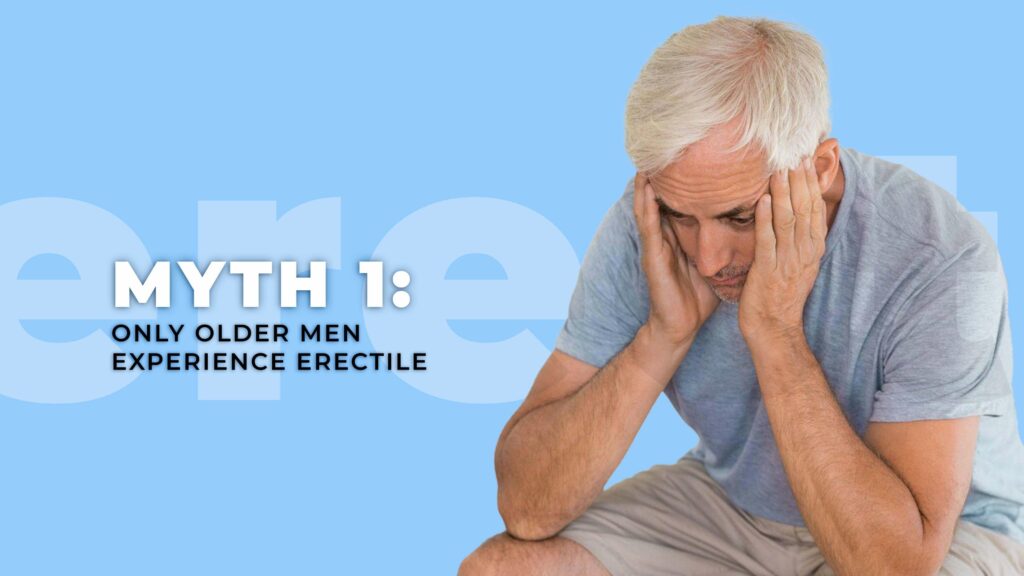Have you ever wondered what’s true and what’s just a misconception when it comes to erectile dysfunction (ED)? Well, let’s dive into the topic and debunk some common myths surrounding ED. We’ll provide you with accurate information to help you understand this condition better. Whether it’s the causes, treatments, or the impact on relationships, we’ll separate fact from fiction. So, get ready to uncover the truth about erectile dysfunction myths and gain valuable insights into this often misunderstood topic.
Common Erectile Dysfunction Myths and Facts
Myth 1: Only Older Men Experience Erectile Dysfunction

Fact: Erectile dysfunction (ED) can affect men of all ages, but the risk tends to increase as you get older.[1] This is because the time it takes to develop erections may lengthen, and the firmness of erections may decrease. Additional factors can also come into play as you age. Some common risk factors for ED include:
- Medical conditions: Diabetes and heart conditions can contribute to erectile dysfunction.
- Tobacco use: Smoking restricts blood flow to veins and arteries, leading to chronic health conditions that can cause ED over time.
- Weight issues: Being overweight, especially if you’re obese, increases the risk of experiencing erectile dysfunction.
- Medical treatments: Certain treatments like prostate surgery or radiation for cancer can impact erectile function.
- Injuries: Damage to the nerves or arteries that control erections, particularly from injuries, can lead to ED.
- Medications: Some medications, including antidepressants, antihistamines, blood pressure medications, pain relievers, or those used for prostate conditions, can contribute to erectile problems.
- Psychological conditions: Stress, anxiety, and depression can affect sexual function and contribute to ED.
- Substance abuse: Long-term drug use or heavy alcohol consumption can increase the risk of erectile dysfunction.
Myth 2: Erectile Dysfunction is Always Caused by Psychological Issues
Male sexual arousal involves various factors like the brain, hormones, emotions, nerves, muscles, and blood vessels. Erectile dysfunction (ED) can occur when there are issues with any of these components. Stress and mental health problems can also contribute to or worsen ED.
Sometimes, Erectile dysfunction can be caused by both psychological and physical factors.[2][3] For example, a minor physical issue that affects your sexual response can lead to anxiety about maintaining an erection, which in turn worsens the condition.
Physical causes of ED can include heart disease, clogged blood vessels, high cholesterol, high blood pressure, diabetes, obesity, metabolic syndrome, Parkinson’s disease, multiple sclerosis, certain medications, tobacco use, Peyronie’s disease, alcoholism, substance abuse, sleep disorders, prostate cancer treatments, pelvic area or spinal cord injuries, and low testosterone.
Psychological causes of ED involve the brain’s role in initiating the physical events leading to an erection. Factors such as depression, anxiety, stress, and relationship problems can interfere with sexual feelings and contribute to or exacerbate ED.
In some cases, both psychological and physical factors work together to cause erectile dysfunction. We recommend you consult a doctor to figure out the underlying causes and find the best treatment options.
Myth 3: Erectile Dysfunction is a Natural Part of Aging
Sexual arousal causes more blood to flow into the penis, which leads to an erection. This happens because the spongy tissue inside the penis traps the blood. A lot of different factors, including mental, emotional, and physical aspects, play a role in arousal and erections.
Erectile dysfunction (ED) can be caused by various issues related to these factors. It could be due to high stress levels or pre-existing health conditions. However, there is a connection between getting older and experiencing ED.
When men reach their 40s, around 5% of them have severe ED. By the time they reach 70, about 15% of men experience severe ED.[4] This increase in ED cases with age is mostly linked to changes in testosterone levels. Testosterone is a hormone in males that is important for sexual function, and it naturally decreases as you get older.
However, experiencing ED that significantly affects your quality of life is not something that inevitably happens as you age. Abnormally low testosterone is a medical condition that can cause other symptoms such as hair loss, weight gain, and ED. Moreover, it can be treated, and regardless of your age, it can help improve your ED.
Myth 4: Erectile Dysfunction is Not Treatable
Erectile dysfunction (ED) can often be effectively treated with medication or surgery. However, some individuals may find success in treating the underlying causes and reversing symptoms without the use of medication. The choice of treatment depends on the individual’s specific situation. While conventional treatments like surgery or medication may not be effective for everyone, there are alternative options that can be explored. One such option is a penis pump, which works by drawing blood into the penis, thereby inducing an erection.
We suggest you consult with a healthcare professional to determine the most suitable treatment approach based on individual circumstances and preferences. They can provide guidance and recommend the best course of action to address erectile dysfunction effectively.
Are you exploring ways to overcome erectile dysfunction (ED) and bring back satisfaction to your sex life? We’ve got you covered! We have a variety of treatment options that include lifestyle changes and advanced medical interventions. Get ready to explore the possibilities and revive the excitement in your intimate experiences!
Lifestyle changes:
- Quit smoking and consider seeking help from smoking cessation programs.
- Manage weight through diet and exercise as recommended by your doctor.
- Limit or stop alcohol consumption.
- Seek assistance to quit using non-prescribed drugs.
Oral medications:
Phosphodiesterase type 5 inhibitors (PDE5i) like avanafil (Stendra), sildenafil (Viagra), tadalafil (Cialis), and vardenafil (Levitra, Staxyn) can help achieve and sustain erections. They require sexual stimulation for effectiveness.
Testosterone therapy:
Testosterone replacement therapy may be prescribed if low testosterone levels contribute to ED.
Alprostadil:
- Self-injection or suppository forms of alprostadil can be used to induce erections by increasing blood flow.
- Topical cream containing alprostadil is also available.
ED pump:
A vacuum pump device can be prescribed to draw blood into the penis and maintain an erection. It involves a plastic tube, a vacuum pump, and an elastic ring.
Surgery:
- Inflatable implants can be surgically placed in the penis, allowing for controlled erection and deflation.
- Malleable implants offer a permanent but bendable solution.
- Arterial surgery may be an option to enhance blood flow in rare cases.
Therapy:
Psychological conditions contributing to or caused by ED, such as stress, anxiety, depression, or relationship issues, can be addressed through therapy with a mental health professional.
Each treatment option has its benefits, risks, and suitability, depending on individual circumstances. Therefore, consulting with a healthcare professional will help determine the most suitable approach for managing ED.
Myth 5: Erectile Dysfunction Only Affects Men
Erectile dysfunction (ED) can have a significant impact on a person’s partner, affecting their mental health. It can lead to feelings of confusion, anxiety, undesirability, and even suspicion of infidelity. These emotions can strain the relationship. Thankfully, ED is often treatable, and there are effective options available to restore sexual function and improve relationship satisfaction.
To address ED, couples should seek the guidance of a doctor who can provide information about available treatments. Attending appointments together is often encouraged. However, finding the right treatment may require some trial and error or undergoing tests. During this process, it is vital for the partner to be supportive, understanding, and open.
Studies have shown that the support of a partner plays a crucial role in dealing with ED. In fact, 94% of men reported that their partner’s support was important to them.[6] Open communication between partners is essential, allowing them to discuss their feelings, concerns, and expectations openly.
Counseling can be a valuable resource for couples navigating ED. It provides a safe space to explore emotions, develop coping strategies, and enhance intimacy. Additionally, couples can explore other forms of intimacy that do not solely rely on sexual activity, fostering a deeper connection.
Lastly, making lifestyle changes can also contribute to addressing ED. These changes may include adopting a healthier diet, engaging in regular physical activity, managing stress levels, and avoiding smoking or excessive alcohol consumption. Taking a holistic approach to overall well-being can positively impact sexual function.
As of now, there haven’t been any over-the-counter pills or supplements that have been proven to be safe and effective in treating ED. However, it’s crucial to understand that prescriptions and supplements aren’t the only approaches to addressing this condition.
The Final Thought:
There are several myths about erectile dysfunction (ED) that need to be debunked. ED can affect men of all ages, although the risk tends to increase with age. It’s important to note that ED is not solely caused by psychological issues, as physical factors also play a significant role. While aging can contribute to ED, it doesn’t mean it is an inevitable part of getting older. The good news is that ED is treatable through various methods, including lifestyle changes, medications, therapy, and medical interventions.
It is crucial to consult with a healthcare professional to determine the underlying causes of ED and find the most suitable treatment options. Remember, open communication, support from partners, and exploring alternative forms of intimacy can also help address ED and maintain satisfying relationships.
Frequently Asked Questions
Do Men with ED have Low Self-Esteem?
Men with erectile dysfunction (ED) may experience low self-esteem as a result of the condition. The inability to achieve or maintain an erection can lead to feelings of inadequacy, frustration, and self-doubt. However, not all men with ED will have low self-esteem. The impact on self-esteem varies from person to person, and some individuals may have coping mechanisms or support systems in place that help them maintain a positive self-image.
How to excite men with ED?
When it comes to exciting men with erectile dysfunction (ED), it’s important to focus on emotional intimacy, open communication, and exploring alternative pleasures. Here are some tips:
Emotional Connection: Foster a strong emotional bond by spending quality time together, engaging in meaningful conversations, and showing understanding and support.
Open Communication: Encourage open discussions about desires, concerns, and preferences, creating a safe space to express needs and explore new experiences.
Sensual Touch: Explore non-sexual intimate activities like cuddling, kissing, and sensual massages to enhance physical closeness and arousal.
Experimentation: Try different techniques and activities that focus on pleasure beyond traditional intercourse, such as oral stimulation, manual stimulation, or the use of sex toys.
Do some guys struggle to get hard?
Some men may experience difficulties in achieving or maintaining an erection, commonly known as erectile dysfunction (ED). Various factors can contribute to this issue, including physical, psychological, or medical conditions. Seeking professional help can provide guidance and potential solutions for those experiencing difficulties in getting or maintaining an erection.
References:
- Mulhall JP, Luo X, Zou KH, Stecher V, Galaznik A. Relationship between age and erectile dysfunction diagnosis or treatment using real-world observational data in the USA. Int J Clin Pract. 2016 Dec;70(12):1012-1018. doi: 10.1111/ijcp.12908. PMID: 28032424; PMCID: PMC5540144. https://www.ncbi.nlm.nih.gov/pmc/articles/PMC5540144/
- Rew KT, Heidelbaugh JJ. Erectile Dysfunction. Am Fam Physician. 2016 Nov 15;94(10):820-827. PMID: 27929275. https://pubmed.ncbi.nlm.nih.gov/27929275/
- Sooriyamoorthy T, Leslie SW. Erectile Dysfunction. [Updated 2023 May 30]. In: StatPearls [Internet]. Treasure Island (FL): StatPearls Publishing; 2023 Jan-. https://www.ncbi.nlm.nih.gov/books/NBK562253/
- A visual guide to erectile dysfunction (no date) WebMD. Available at: https://www.webmd.com/erectile-dysfunction/ss/erectile-dysfunction
- Rew KT, Heidelbaugh JJ. Erectile Dysfunction. Am Fam Physician. 2016 Nov 15;94(10):820-827. PMID: 27929275. https://pubmed.ncbi.nlm.nih.gov/27929275/
- Hongjun, Li & Gao, Tiejun & Wang, Run. (2016). The role of the sexual partner in managing erectile dysfunction. Nature Reviews Urology. 13. 10.1038/nrurol.2015.315. https://www.researchgate.net/publication/292944012_The_role_of_the_sexual_partner_in_managing_erectile_dysfunction

It’s hard to find knowledgeable people on this topic, but you sound like you know what you’re talking about! Thanks